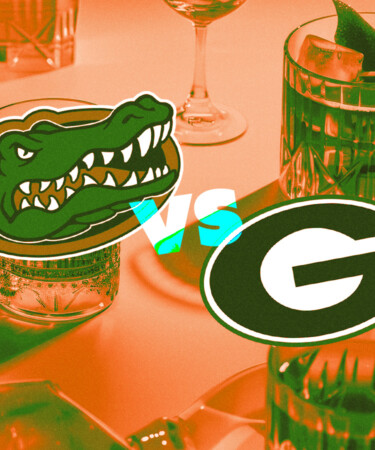Tailgating a football game is one of America’s most time-honored traditions. Before cars were even invented, fans arrived at sporting events with provisions in tow to witness the events of the game unfold. Nowadays, tailgates are easily the largest celebrations in college football, with hundreds of thousands of fans flocking to stadiums nationwide on a weekly basis for pre-game snacks, corn hole tosses, and, of course, drinks.
On rivalry game days — think Michigan versus Ohio State, Alabama versus Auburn, Army versus Navy — these tailgates swell even larger, delivering an atmosphere that’s sizzling with equal parts tension and excitement. But while these tailgates get a lot of attention for the games they precede, it’s not often that they’re deemed iconic enough to live up to the main event itself. And yet, that’s exactly what happened at the legendary Georgia-Florida showdown in the 1950s.
In 1958, sports editor Bill Kastelz attended the game on assignment for The Florida Times-Union. Held annually on neutral ground in Jacksonville, Fla., the University of Georgia–University of Florida matchup is known for its fierce competition and raucous atmosphere. The previous year, the Gators shut down the Bulldogs 22-0, and Kastelz was expecting another exciting game. Instead, he described the game as “run-of-the-mill,” with Florida achieving a marginal 7-6 victory over its rival. Struggling to come up with something to say of the game for his article, Kastelz instead focused on the energy leading up to the event itself.
While at the game, Kastelz observed thousands of fans openly consuming alcohol, with zero repercussions from law enforcement. On one occasion, he even allegedly witnessed a drunken fan offer a drink to a uniformed police officer, stumbling over them in the process. The goings-on inspired the writer to coin the phrase “the World’s Largest Outdoor Cocktail Party” to describe the game, and the name just stuck.
Despite coming up with the iconic moniker, Kastelz explained in an interview with The Tampa Bay Times in 1974 that he never intended to make history — he was just struggling with writer’s block. “The phrase just came to me,” he explained. “That’s what it seemed like… the World’s Largest Outdoor Cocktail Party.”
The phrase wasn’t just used by fans and journalists, though — both the University of Florida and the University of Georgia and even the SEC used “World’s Largest Outdoor Cocktail Party” to refer to the rivalry game. That was until 1988 when two back-to-back games pushed the schools, their parent conference, and even the city of Jacksonville to start phasing the nickname out.
At the 1984 matchup, Florida finally ended a six-year losing streak to the Bulldogs, securing a shutout 27-0 victory. The win emboldened Gators fans to tear down the goalpost in Georgia’s end zone and dance around on the field with it. The next year, when the Bulldogs defeated the Gators 24-3, fans returned the favor, storming the field after the game, attempting to pull down Florida’s goalposts.
Due to ongoing fears that the moniker was leading to increased alcohol consumption, officials stopped using the term to describe the game by the late 1980s. But the unofficial language surrounding the game didn’t change. For decades, media outlets and fans continued using the name to describe the game, prompting the SEC and both university presidents to reach out to CBS in 2006 with a request to avoid the phrase.
The appeal didn’t seem to have much sway, though. That same year, the University of Georgia’s then-president Michael Adams admitted that the network made it clear that it was “within its rights” to use “the World’s Largest Outdoor Cocktail Party” if it wanted to. While the nomenclature was prohibited from all official messaging, it still lives on with nostalgic fans of both universities who just can’t let it go.
Today, “the World’s Largest Outdoor Cocktail Party” has been simply renamed the Georgia-Florida game or the Florida-Georgia game, depending on whom you ask. The university that should be named first, naturally, depends on which school you’re a bigger fan of. Whichever way you choose to say it, you can catch this year’s game on Nov. 1.
